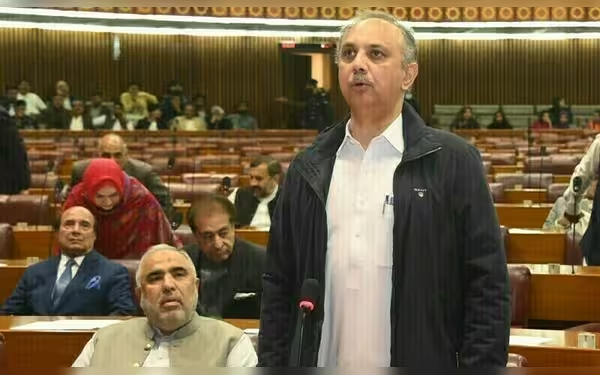Thursday, November 7, 2024 06:43 AM
Omar Ayub Criticizes Rushed Legislation in National Assembly
- Omar Ayub condemns hasty legislative actions.
- Ruling coalition labeled a 'government of thieves.'
- Concerns raised over transparency and accountability.
 Image Credits: dawn.com
Image Credits: dawn.comOmar Ayub criticizes the ruling coalition for rushed legislation in the National Assembly, raising concerns over democracy and accountability.
In a dramatic turn of events during the National Assembly session, Omar Ayub, a prominent member of the Pakistan Tehreek-e-Insaf (PTI) party, voiced strong criticism against the ruling coalition for their hasty legislative actions. The session commenced with tensions high, following the swift passage of six bills the previous night, which Ayub described as a "shameful incident." This incident has sparked significant debate regarding the integrity of the legislative process in Pakistan.
Ayub's remarks were pointed and direct, as he labeled the ruling coalition a "government of thieves," suggesting that the rapid approval of the bills was not only undemocratic but also indicative of deeper issues within the government. His comments reflect a growing frustration among opposition members who feel sidelined in the legislative process. The opposition's concerns are rooted in the belief that such rushed decisions undermine the democratic principles that should govern the assembly.
In response to Ayub's criticisms, a minister from the ruling coalition interrupted, asserting that he would not permit the opposition member to speak without first presenting his own perspective. This exchange highlights the ongoing tension between the government and the opposition, as both sides struggle to assert their narratives in a highly charged political environment.
The swift passage of legislation without thorough debate raises important questions about transparency and accountability in governance. Citizens are left wondering whether their representatives are truly serving their interests or merely pushing through agendas that benefit a select few. The implications of such actions can be far-reaching, affecting everything from public trust in government institutions to the overall health of democracy in Pakistan.
As the National Assembly continues its session, it is crucial for lawmakers to engage in meaningful dialogue and ensure that all voices are heard. The legislative process should not be a mere formality but rather a platform for robust discussion and deliberation. Only through such engagement can the government hope to regain the trust of the people it serves. In the end, the health of a democracy is measured not just by the laws it enacts but by the integrity of the processes through which those laws are created.













